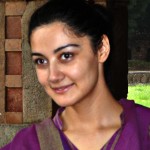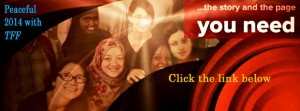Archive for the ‘From our own world’ Category
Som broar över mörka vatten – ett integrationsprojekt
Av Christina Spännar & Vibeke Bing
Kanske du associerar TFF med Jugoslavien, Burundi, Irak, Iran, ickevåld och fredsdebatt? Men vi har i tre år också arbetat med frågor kring integration med tonvikten lagd på ensamkommande barn från Afghanistan. Insatsen här har letts av författarna av denna projektsammanfattning.
Vi är stolta över att nu publicera bloggen Som Broar Över Mörka Vatten där allt material finns. Projektet har finansierats av Arvsfonden.
“När vi åkte gummibåt över Turkiets hav till Samos i Grekland greps vi av Grekiska poliser. Poliserna kastade alla våra kläder i havet och gjorde små hål i vår båt.” Ali
“På kvällen satt vi i en båt. Vi åkte till Grekland. På vägen till Grekland fick vi problem med båten. En polisbåt kom och klippte sönder en del av motorn. Vi paddlade med händerna och fyra åror.” Hassan
Vi lever i en märklig tid. Framför våra ögon pågår en stor migrationsvåg av ensamma barn. Något liknande har inte hänt sedan de finska vinterkrigsbarnen kom till Sverige på 40-talet.
De barn, som utan föräldrar, nu flytt hit undan krigets fasor har gjort en annan resa. De kommer från länder vi inte vet mycket om. Vilka är dessa barn och ungdomar, vad tänker de på och hur är livet i Sverige? Vi har lärt känna och lyssnat till några av dem. De är alla från Afghanistan.
Hur deras berättelser kommit till och vad de har att säga kan man läsa i denna rapport, som summerar tre års projektarbete. Här kan man också få veta hur vi sökt arbetsformer som kan underlätta den svåra etableringsfasen.
Vi berör också det komplicerade i att återförenas som familj.
Vi vänder oss till alla som arbetar med barn, ungdomar och föräldrar. Men också till alla som är nyfikna på vad som sker i vår samtid.
Känns läsningen tung – bläddra vidare till pojkarnas berättelser och det öppnas en ny värld.
En av de unga sammanfattar vår tid tillsammans såhär:
– “Jag har fått hjälp, ni har fått hjälp, vi hade kul!”
Det är bara att instämma!
Vibeke Bing
Projektledare, folkhälsovetare
vibeke@vibekebing.se
076-6451147
0304-663396
Christina Spännar
Projektledare, sociolog
christina.spannar@telia.com
070-1450171
046-129249
Sammanfattning av projektet
Som broar över mörka vatten – ett integrationsprojekt har haft som övergripande syfte att stärka människor i övergångsskeden i livet. Målgrupper har varit nyblivna föräldrar, ensamkommande flyktingbarn/ungdomar samt föräldrar som kommit till Sverige som flyktingar eller som anhöriginvandrare till ensamkommande flyktingbarn och ungdomar.
De övergångsskeden som stått i fokus är att bli förälder och att migrera. I det senare fallet handlar det om att bryta upp från ett socialt sammanhang och finna sig till rätta i ett nytt. I migrationsprocessen ingår ofta också att återförenas som familj efter år av splittring.
Projektet kan liknas vid ett träd, Read the rest of this entry »
Moratorium on comments addressing the Israel/Palestine struggle
By Richard Falk
It has always been my intention to make the tiny fragment of the blogosphere that I inhabit a site for civil discourse on a wide spectrum of concerns, issue oriented interpretations of what is transpiring in the world.
Recently the comments sections has narrowed from this perspective into a dialogue between adversaries, several of whom seem preoccupied with, if not obsessed by, Israel, the Jewish experience, Zionism, and the Palestinian/Arab narrative and counter-narrative. Some of the contributions have been learned and sensitive to the reality that there are many diverse voices that need to be heard on this inflamed subject-matter, yet others have been intolerant, launched repeated personal attacks questioning motives and motivations, and have created a polemical aura at the site that has inhibited participation by those with other interests, concerns, and style.
For these reasons, I have decided to have a moratorium on all comments relating to this subject-matter until May 1, 2014.
I expect this might be troublesome for several faithful readers of my posts. Please bear with me, and understand this to be an effort to encourage more varied and less antagonistic exchanges.
I am suspending this portion of the comments section at a moment that coincides with the ending of my six-year term as Special Rapporteur on Palestine for the UN Human Rights Commission.
Let me add that I will continue to do my best to remain engaged in the struggle to find a just and sustainable peace for both peoples premised upon their equality.
IPRA – International Peace Research Association – at 50
By Johan Galtung
Known as IPRA, founded in 1964 in London–and this author, 34 at the time, is the only surviving founder. IPRA rotates every two years from one peace research center to the other, and is now in very competent Turkish hands. And what is more natural than having the 50th anniversary for the hub of peace studies in that hub of the world, Istanbul, 10-14 August this year!! Hurry up, register!!!
Today it is hard to believe, but to get IPRA started was as problematic as to launch peace studies in general.
The Western establishments did not like “peace”; their favorite was security, absence of violence against themselves in particular and their elites even more particularly. Security studies became academically institutionalized Western paranoia.
And the peace movement establishments did not like “studies”–what was there to study? Each one knew the one correct answer! Read the rest of this entry »
Q & A with TFF Associate Heela Najibullah
The daughter of Afghanistan’s last communist president reflects on politics and pluralism in the strife-riven state.
Heela Najibullah was only 10-years-old when her father became the president of Afghanistan. To Heela, Mohammad Najibullah was Aba, father, trying to create reconciliation among an Afghan nation divided between communists and Mujhaideen, religious warriors fighting the Soviet occupation.
Though Heela saw her father working towards an inclusive solution to the Afghan conflict, few in the general population could separate Najibullah the communist from Najibullah the president calling for reconciliation.
In the decades since, however, Najibullah’s image has undergone a transformation. Pictures of a man once tied to communism now hang in people’s cars, windows and shops.
In an interview Al Jazeera, Heela Najibullah talks about her father’s changing image 25 years after the Soviet withdrawal. Continue reading the interview here…
Imperiled Polities: Egypt and Turkey – Two visions of democracy
By Richard Falk
The Meaning of a 98.1% Vote
In mid-January there was a vote in Egypt as to whether to approve a constitution drafted by a 50-person committee appointed by the interim government put in place after the military coup carried out on July 3, 2013. The constitution was approved by 98.1% of those who voted, 38.6% of the eligible 53 million Egyptians.
This compares with 63.8% support received by the constitution prepared during the presidency of Mohammed Morsi from the 32.9% of the Egyptian citizenry that participated in the vote. It should be observed that this new constitutional referendum was boycotted by both the Muslim Brotherhood (MB) and various of the youth groups that has been at the forefront of the anti-Mubarak upheaval in 2011.
Also the validity of the vote was further discredited because of the atmosphere of intimidation in Egypt well conveyed by the pro-coup slogan: “You are either with me or with the terrorists.” Not only had the MB been criminalized, its assets seized, its leaders jailed, its media outlets shut down, but anyone of any persuasion who seemed opposed to the leadership and style of General el-Sisi was subject to arrest and abuse.
In the background here are questions about the nature of ‘democracy,’ and how to evaluate the views of people caught in the maelstrom of political conflict. On one level, it might seem that a vote of over 90% for absolutely anything is an expression of extraordinary consensus, and as a result el-Sisi’s constitution is far more popular than Morsi’s constitution, and hence more legitimate. Reflecting on this further makes it seem evident, especially when the oppressive context is to taken into account that the one-sided vote should be interpreted in the opposite manner, making Morsi’s vote more trustworthy because it reached plausible results.
Any vote in a modern society that claims 98.1% support should be automatically disregarded because it must have been contrived and coerced. Read the rest of this entry »
The story and the page you need
By Jan Oberg
Here is a short – 1:46 min – video about TFF and an appeal for your support.
2013 was a disappointing donation year. We urgently hope you’ll think of peace and TFF in 2014.
If you can’t support us with money, could you be so kind to post or mail the link in your circles?
Many many thanks!
TFF awarded the People’s Nobel Peace Prize
By Jan Oberg
TFF and its founders were awarded the People’s Peace Prize on December 7, 2013 by The Peace Movement at Orust, Sweden – the best in Scandinavia and one that has existed for over 30 years in an amazing public role and staunch adherence to the Gandhian/UN principle of creating peace by peaceful means.
Jan Oberg received the prize on behalf of the foundation at a seminar held at Orust about the Norwegian Nobel Committee’s ignorance – seen through its awards the last years – about the real meaning of Alfred Nobel’s will which you may read here.
While the text here is in Swedish enjoy the photos and get a sense of the lovely people, the atmosphere and the fabulous Nobel dinner.
While this prize is not accompanied by any money, we will that it has something the official Norwegian Nobel Prize does not have: decision-makers who know what peace is and what Alfed Nobel really intended.
Thank so very much for this great encouragement. We promise to continue on the road that is peace…





